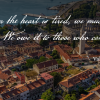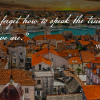
Published: June 15, 1999
View the Original Newsletter: Iskra-36.pdf
About This Issue
Iskra No. 36 arrives at a crossroads — as NATO’s bombing of Yugoslavia draws to a close and the world faces a fragile new reality in the Balkans. The issue’s central essay by Valentina Krčmar reflects on how Croats view the end of the Kosovo War and what “peace” truly means after years of trauma and propaganda. It also features key political updates, community news from Canada, cultural highlights, poetry, and commentary that intertwines faith, memory, and the resilience of a people still rebuilding from war.
Motrišta: “A Time to Reflect”
In her column, Valentina Krčmar writes about the uneasy calm following the end of the NATO bombing campaign in Yugoslavia. She reflects on how, for Croats, the end of the conflict stirs conflicting emotions — relief that Milošević has been weakened, but sorrow at the suffering endured by innocent civilians.
She observes that some in the West have already forgotten Croatia’s experience during the Homeland War, treating Kosovo as an isolated event rather than part of a long continuum of aggression. Krčmar warns readers not to be lulled into complacency:
“Evil does not vanish when the bombs stop falling. It only hides and waits for silence.”
She also calls on Croatians abroad to remain active voices in public discourse, to write letters, and to challenge the revisionism spreading in international media. “Our moral task,” she concludes, “is to remind the world that peace without justice is only another form of delay.”
From the Editor’s Desk
Valentina opens with a warm acknowledgment of readers’ letters and donations, expressing gratitude for their continued engagement and trust. She shares her concern that many Canadians and Western Europeans remain uninformed about Croatia’s postwar recovery, noting how misinformation still clouds the country’s image abroad.
She thanks contributors who provided reports on community events, including members of AMCA, the Croatian Canadian Congress, and parish volunteers who continue to promote Croatian culture across Ontario.
Her closing thought is personal: “Croatia’s greatest wealth is not gold or land, but the hearts of its people — scattered across the world yet bound by the same song.”
News from Croatia
The political section reports a range of major developments:
-
End of the Kosovo War — On June 10, 1999, NATO suspended its bombing campaign following the signing of the Kumanovo Agreement, leading to the withdrawal of Yugoslav forces from Kosovo.
-
President Franjo Tuđman’s Statement — Tuđman welcomes peace, urging Croatians to help stabilize the region and maintain diplomatic balance amid changing international alliances.
-
Refugee Concerns — The Croatian government warns of possible refugee spillovers into its territory, pledging humanitarian assistance while emphasizing border security.
-
Opposition Calls for Reform — Croatian opposition leaders demand greater press freedom and transparency ahead of upcoming parliamentary elections.
-
Economic Focus — The Finance Ministry announces measures to curb inflation and attract foreign investment as part of its postwar recovery plan.
-
International Relations — The U.S. and European Union reaffirm support for Croatia’s integration into Western political structures, citing its stability and reform efforts.
Community Life in Canada
Croatian Statehood Celebrations
Across Ontario and beyond, Croatian-Canadian communities mark Statehood Day with pride and festivity. In Toronto, Mississauga, and Hamilton, churches hold Masses followed by picnics, concerts, and speeches honoring the sacrifices that built the Republic of Croatia.
New AMCA Initiatives
The Croatian Alumni Association (AMCA) launches a mentorship program connecting young professionals with Croatian business leaders in North America and Europe. The goal, Valentina writes, is “to turn talent into continuity — so that every generation adds a stone to the same foundation.”
Humanitarian Fundraiser
The Croatian Women’s Association Katarina Zrinska holds a dinner in support of children displaced by the Kosovo conflict, reaffirming Croatia’s humanitarian leadership.
Upcoming Events
-
Croatian Heritage Night at Ontario Place, featuring live folklore and tamburitza music.
-
Annual AMCA Picnic on July 11 in Milton.
-
Croatian Credit Union AGM in Toronto, reviewing its growing portfolio of community loans.
Culture and Heritage
“A Visit to Dubrovnik”
A richly descriptive feature transports readers to Dubrovnik’s Old Town — its marble streets, Renaissance churches, and the enduring beauty that has made it a “city of light.” Krčmar writes that Dubrovnik’s calm sea walls now symbolize not only history but healing.
Folk Traditions
An article explores the heritage of Dalmatian klapa singing, emphasizing how harmony and emotion have preserved identity through centuries of hardship.
Poetry
The issue includes a new poem by Ivica Puhalo, “Tamo Gdje Srca Govore” (“Where Hearts Speak”), capturing longing, hope, and the quiet strength of Croatians abroad.
Health and Wellness
A health column discusses sleep quality and stress, linking the emotional aftermath of conflict to mental and physical health. The article offers practical tips for relaxation, prayer, and maintaining balance — reminders that healing is as much spiritual as it is physical.
Sports
Croatian athletes continue to shine internationally:
-
Janica Kostelić wins another junior World Cup title.
-
Goran Ivanišević advances to the quarterfinals in Nottingham, preparing for Wimbledon.
-
Croatia Zagreb stabilizes after a turbulent spring season, ending in second place in the national league.
Closing Thought
Iskra No. 36 bridges a moment of exhaustion and endurance — a pause between wars, both political and emotional. Through Krčmar’s reflective lens, readers are reminded that peace requires more than treaties; it requires memory, responsibility, and the courage to keep telling the truth.




